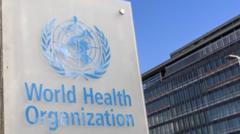The move raises concerns about the future of global health initiatives and the potential impact on diseases affecting millions worldwide.
Trump Initiates US Withdrawal from WHO, Threatening Global Health Funding

Trump Initiates US Withdrawal from WHO, Threatening Global Health Funding
Trump's new executive order marks a significant shift in US commitment to the WHO, potentially leading to a one-fifth budget reduction for the organization.
In a dramatic legislative move, President Donald Trump has signed an executive order that initiates the withdrawal of the United States from the World Health Organization (WHO). This action, taken on his first day back in office, is reminiscent of previous attempts to exit the global public health body during the COVID-19 pandemic. According to Trump, the decision stems from allegations that the WHO mishandled the COVID crisis and has remained overly influenced by China.
"I call this a substantial decision," Trump remarked during a signing ceremony in the Oval Office, reflecting his administration's longstanding criticism of the WHO's management, particularly during the pandemic's onset. This recent order echoes Trump's former stance, where he accused the organization of favoritism towards China in issuing health guidelines. Despite a period of renewed engagement under President Biden, which saw the U.S. become the largest contributor (almost 20% of a $6.8 billion annual budget), the executive order pointed to "unfairly onerous payments" and repeated deficits in organizational reforms.
Public health experts are sounding alarms about the wider implications of this withdrawal. With the U.S. being a significant financial backer of the WHO, its exit could create a vacuum that hampers responses to international health emergencies, including future pandemics. Prominent health officials have warned that ending U.S. affiliation with the WHO may not only weaken global health responses but could also exacerbate existing health crises, such as outbreaks of malaria, tuberculosis, and HIV/AIDS.
Critics of the decision express concern about the potential for increased Chinese influence within the WHO, while some proponents speculate that this move may pressure the organization to undergo significant reforms. Trump's insistence on reform signals a desire to reshape global health governance.
As the global health community watches the unfolding situation, the ramifications of this directive could reshape international public health strategies and the ability to manage diseases that transcend borders, sparking debate about the U.S.'s role in global health leadership.





















